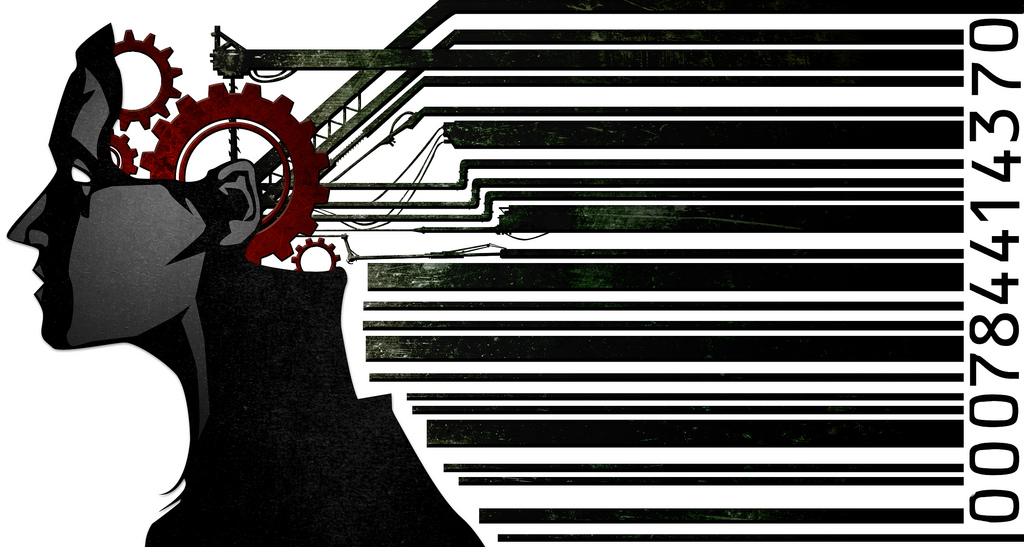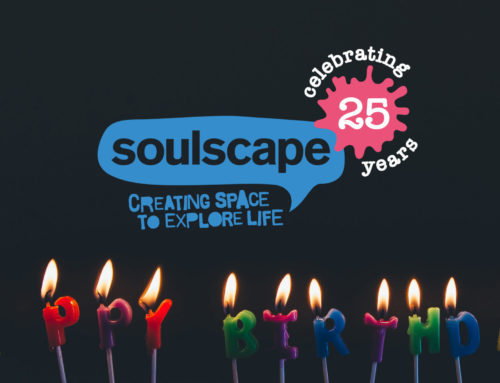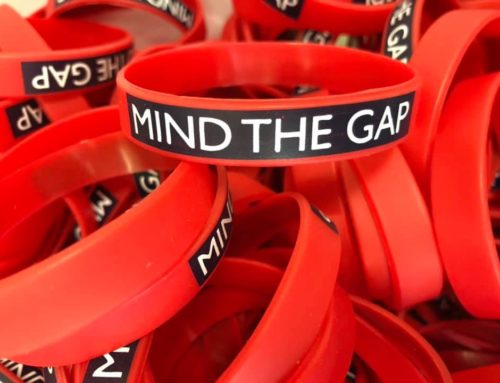In this extended article, Soulscape’s Chair of Trustees, Matt Valler, explores how the Christian faith – particularly the core idea of the ‘kingdom of God’ – offers resources for how we think about education in a consumer culture, and how work with young people can be reimagined as a result.
It’s the third century BC, and on a hillside outside Athens an audience has gathered to watch the latest theatrical performance. In a thrilling tale, the characters have been set up for a complex climax. What will happen? How will this get resolved?
Then from above the stage a familiar and formidable face is lowered onto set. A god has entered the fray, and with divine power resolves the complex plot with supernatural intervention. The audience boo; yet again sloppy script-writing has taken the easy way out and robbed the human drama of its meaning.
When 20th century German theologian and martyr Dietrich Bonhoeffer wrote his Letters From Prison, he referred to the wheel-on god of the Greek playwrights. It was known as the deus ex machina, literally the mechanical god, and it was infamous as a tool of those who could only offer easy answers. We have reduced God to a deus ex machina claimed Bonhoeffer. Our God intervenes to make complicated life nice and simple, giving us what we need just when we need it.
Consumerism is the deus ex machina of our age. As a secular society we have placed our faith in the wheel-on god who offers to solve all our problems with products or services. We have literally sold our soul to this god; our economic systems are predicated on consumer spending as the primary engine of growth. The planet can’t sustain it, but we can’t stop it. Our narratives are like the ancient Greek scripts; tired out, but unable to find a creative alternative.
Education in an age of consumerism must deal with these profoundly theological issues – whether we profess faith or not. Consumerism is not just a behaviour; it’s not just the rampant buying of stuff in a desperate quest for satisfaction. It’s not just an attitude, the resolute belief that the world should satisfy my desires and demands. Consumerism is so much more even than that: consumerism is a theological system. It is an entire way of running the world that defines our identity, our relationships and how we live and act in the world. It’s a god that promises salvation, but demands everything from us to deliver it.
We won’t figure out what to do with consumerism by designing better youth programmes or even cultivating different values – though that might be an important part of it. To really begin to deal with the totalising power of consumer culture we need a powerful theology that can subvert the norm and offer us an alternative.
In this article I’ll argue that much Christian public theology has not been up to the task. But with a different – actually more biblical – understanding of the powerful idea of the kingdom of God we can create space for an alternative to the oppression of consumer culture, and empower young people to create a new future for us all.
The shape of the Kingdom of God
‘The coming of the kingdom of God is not something that can be observed’ says Jesus. ‘Because the kingdom of God is in your midst.’ (Luke 17:21)
For hundreds of years the Jewish people had imagined the kingdom of God to be something they could very well observe. It would come on the back of a mighty military campaign, led by the Messiah. Everyone would know it had come because Yahweh would rule from his Temple on Mount Zion. It would spell the end of all other empires – finally the empire of Israel would rise in glorious splendour for all to see.
This is what most of us miss when we read of Jesus talking about the kingdom of God in the gospels. Sometimes we even think of Jesus talking about a reality for the next life. But every Jew in Jesus’ day knew all about the kingdom of God. It was a political and religious dream for self-rule. And it was top of the agenda.
Mark opens his gospel with the line: ‘The beginning of the gospel of Jesus the Messiah, the Son of God.’ The word gospel was well known in Jesus’ day. It was what happened when Caesar won a military victory; his ambassadors would ride throughout the Roman empire proclaiming the gospel of Caesar, the son of god – the ‘good news’ that he had conquered and his kingdom was advancing.
So when Mark writes that there’s a gospel of Jesus, it’s pretty incendiary stuff. And not only that, Mark also calls Jesus the Messiah, which everyone knew was the title for a revolutionary figure. And to cap it all off, he calls Jesus the Son of God, the title Caesar had adopted to give his reign divine legitimacy. The opening of Mark’s gospel is a blazing political challenge. The days of Caesar are numbered: a new king has come.
But Jesus the Messiah, the Son of God with a gospel to rival Caesar’s has no army, no chariots or swords. He does not enter Jerusalem as a liberator should, but comes on a donkey with a dancing entourage of children. He doesn’t make for the Roman palace, but for the Temple to challenge religious oppression.
So what does the kingdom of God mean? Why does Jesus talk so much about it if he’s going to bail on the idea?
Ok, so you remember that story in Mark, Matthew and Luke about the guy with ‘Legion’ demons? He lives in the tombs and nobody can control him. Jesus goes there to see him and drives the demons out into a massive herd of pigs that hurtle headlong down a hill and into the sea. At the end of the story the people of the region are terrified and beg him to leave. Have you ever wondered why?
People generally have said it’s because the pigs were a key part of the local economy, and they didn’t want Jesus bankrupting them. But I’m not sure that really makes sense; they might be angry, but why be terrified? After all Jesus just healed a man they didn’t know how to control – that’s a good thing, right?
Here’s the real reason the people wanted him to leave. It’s because that exorcism is full of political symbolism. Gerasa where this all takes place was host to a massive Roman garrison; ‘Legion’, the name of the demons, is the name for a Roman army unit; and in Jewish society pigs were a symbol of unclean Gentile occupation. The Roman gentile pigs weren’t just unclean – they weren’t supposed to be there! So when Jesus casts a demon called Legion into a herd of unclean pigs and sends them crashing in the sea, you can’t escape the implications. This is not just about a man who lives in the tombs. It’s a symbolic exorcism, a prophetic symbol of the exorcism of Rome from the land, to be swallowed by the sea like the armies of Egypt.
If that’s not asserting one kingdom against another I don’t know what is!
But here’s the thing: the point is it’s symbolic. Jesus can’t actually force the Romans to leave the land. But he can bring a man driven out of his mind by their oppression back to mental health. He can’t remove their swords, but he can take the sting from their power. He can drive out the demons that haunt people and offer them a new way to live, Roman garrison or no Roman garrison.
Jesus brings a new kingdom which is much more profound than the redrawing of a political map, much more significant than who is on the throne. Jesus’ kingdom challenges the authority of Rome over the minds and hearts of its people. It creates a space within communities for people to experience freedom. Rome might own the roads, the water supply, the currency; they might govern when you can leave your house and when you must return. But they cannot police your mind; they cannot colonise your soul. Not if you don’t let them!
In the final scene of John’s gospel, Jesus is sitting next to the Sea of Tiberius quietly frying some fish for his disciples, breaking bread with them. Which wouldn’t be so unusual if he hadn’t been executed in the name of the Emperor Tiberius just days earlier. When Jesus sits by the Sea of Tiberius frying some fish for his friends, he’s not just making breakfast. He’s doing it in quiet defiance of the Caesar that just had him killed!
Jesus’ kingdom is a space for people to explore life in all its fullness. It is a space which can never be shut down. You can try to control it, but it will escape you. You can drive it into hiding, but it will drive you into the pigs. You can kill it, but it will just reappear and fry fish by the sea with its friends.
The kingdom of God is the always-elusive freedom of a space outside the oppressive system; a rival power that plays by entirely different rules. The powers of this world rule with doctrines. The kingdom of God holds back the doctrines to create space for freedom. And this is the gospel: that the Kingdom of God is at hand. That free space is here, within reach. It is ‘in our midst.’
Creating space to explore life
The mental health charity YoungMinds recently published the results of research they’d done with around 2000 11-24 year olds across Britain.[1] Over half said they believed they would be a failure if they didn’t get good grades. Half had been bullied, with a third saying they didn’t know who to turn to when they felt depressed or anxious. Over half of 11-14 year olds said they had seen online pornography, with 40% of those saying it affected relationships with others of their age.
This is the power of consumerism. We are not living under an oppressive political empire (whatever you think of the current government!). Hard won freedoms make our lives unimaginably different from first century Palestine under Roman rule. But we are still not free. Today’s battle is for the mind and the soul. And when it comes to young people we are losing that battle.
We have a consumer-driven education system so obsessed with meeting grade-based targets in order to offer league table places to parents that young people are basing their entire self-worth as human beings on the outcome of their exams.
We have consumer-driven identity-formation so forceful in its demands that young people believe their ability to participate in society rests on which brands they wear, on the shape of their bodies; that the gadgets and shoes and haircuts must be right or they must bear the shame of exclusion.
We have a consumer-driven culture of sexuality among young people unlike any we could have imagined even ten years ago. The Internet has brought with it a landslide of pornography which is reshaping the way young people view their bodies and their relationships, and turning huge swathes of young people into sex addicts and sex objects.
None of these realities are new. But the scale of their power is.
Under this oppression young people don’t need any more doctrines. They have enough doctrines foisted on them from the education system, from consumer culture, from their peers. What they need is space. Not a vacuum, but a space to be free from the relentless pressure heaped on them; a space to explore life for themselves; a space for their souls to breathe and their minds to reflect; a space in which they are not judged or cajoled or pressured, but in which they can begin to find life, a life in all its fullness.
Some Christians have tended to talk as if helping young people think for themselves is woolly, a kind of wishy-washy ‘liberal’ approach to faith where we shy away from the difficult truth of God’s Word and its demand on our lives. It’s not what we think that matters, it is said, but what God thinks.
The problem with that approach is that it assumes that God’s Word is clear; that the problem is we know how we should live, but choose not to. I don’t know about you but I’ve never found it very straightforward to think about the place of education and grades in my life – do they matter or not matter? Sort of both, right? What about self-worth? I’m made in the image of God – ok but what does that mean? What about wealth? Should I be selling everything I have and giving it to the poor? What’s the acceptable limit on buying ethically? What about sexuality? If I’m not watching porn or having sex before I’m married then how am I expressing my sexuality – or should I just shut down that part of my life for a while? Life is not straightforward and on most of life’s difficult questions the Scriptures aren’t either.
The truth, in fact, is that truth must be explored and discovered to become something that transforms.
Young people need the gospel of Jesus – that another kingdom is within reach. A kingdom that challenges the culture that oppresses; a kingdom that does the muscular, difficult work of creating space so that people can find life. A kingdom that opens like a door onto a space the oppression of the world can’t touch; a soulscape, where those who are weary can explore the landscape of their lives – spiritually, intellectually, emotionally, vocationally; where those who have never been able to question the way the world is have the opportunity to imagine a different future.
A new paradigm for Christian discipleship with young people
The kingdom of God creates space to explore life. This is the theology that has the power to challenge consumerism. By using that space to unmask the deus ex machina of consumer culture we provide an empowering environment for young people to critically reflect on their life, on the doctrines that drive it, and through which they can find the faith to imagine an alternative.
In the professional disciplines of education and youth work we describe that process as ‘reflective practice’. As we reflect self-critically on our work in order to do it better we also encounter the various doctrines (whether religious or secular) that drive us. In response we reimagine our practice with greater self-awareness and the cycle of reflection continues. However, reflective practice is usually studied as a professional discipline – in other words it’s something we do as youth workers and educators. It’s not necessarily something we teach young people to do.
The theology that the kingdom of God creates space to explore life is a theology of reflective practice – and making it central to how we work could give us a better approach to education and a new paradigm for Christian discipleship with young people.
For the Christian youth work community specifically, it is a way to help bridge the gap that has opened up between Christian ‘youth work’ as a largely secular, education-focussed, JNC-regulated activity undertaken by Christian youth workers on the one hand, and ‘youth ministry’ as a specifically discipleship-focussed church-based pursuit on the other.
Disciple-making becomes a focus for both contexts by imagining Christian youth work as an act of strength undertaken on behalf of young people. The task of creating space for young people to explore life is not straightforward; it takes emotional, spiritual, pastoral and intellectual courage. As we work to create spaces – both physical and metaphorical – to hold back oppressive pressures, even for just small moments here and there, we are making opportunities for young people to be free, to explore life so they can create an alternative future. We are following Jesus by doing the very thing he did most effectively in his own life and ministry – and by teaching young people to do the same we are making disciples.
The deus ex machina only closes life down with simplistic solutions, but the God who holds open a space is at home with ambiguity and complexity. If we want to help young people move beyond consumer-faith, we need to stop packaging God as a solve-all product. The God we see in Jesus suffers and dies; and in so doing opens a space for new life to emerge.
Matt Valler is the Chair of Soulscape.
An edited version of this article first appeared in the Jan 2015 edition of Youthwork Magazine under the title Youth Work in an Age of Consumerism. You can read that article here.
Image by https://www.flickr.com/photos/truthout/
[1] http://www.independent.co.uk/life-style/health-and-families/health-news/mental-health-riskto-children-trapped-in-toxic-climate-of-dieting-pornography-and-school-stress-9070710.html






Leave A Comment